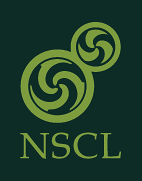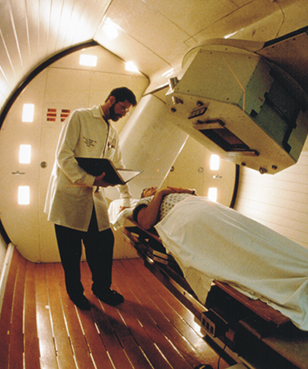Dr. Jeffrey Foreman & patient in using the Harper Hospital Cyclotron in 1996.
Applications
Applied Isotope Science is a new research initiative at NSCL/FRIB to advance and innovate the production of rare isotopes and the use of ion beams for both basic science and applications.
The scope of the Applied Isotope Science program includes research and development that addresses open questions in rare isotope production at high beam power and the preparation and manipulation of rare isotopes beams to meet basic science and application needs. The program also includes the development of techniques to harvest isotopes produced but so far unused. Such developments are critical for enabling multi-user capability at facilities like NSCL and FRIB and for providing isotopes in research quantities for a variety of societal and interdisciplinary applications. One example is the medical uses of isotopes. Research in this area is limited by the availability of the appropriate isotopes, but studies at the NSCL are exploring better ways to provide samples of interesting isotopes like 67Cu. Other examples of applications of isotopes are in nuclear forensic to help securing national security or for Nuclear Energy and Nuclear Waste Disposal where decay characteristics and neutron capture rates of key isotopes is still needed. The development of harvesting techniques at NSCL will benefit FRIB in the future.
Applied Isotope Science also supports interdisciplinary research on the interaction of swift heavy ions (SHI) of stable and rare isotopes with matter. This area of “Extreme Material” research is not only important for a better understanding of radiation damage and possible mitigation in materials but it also has the potential to lead to the development of new materials by means of SHI irradiation. NSCL has the unique capability to provide SHI over a wide energy range not available elsewhere in the US.




